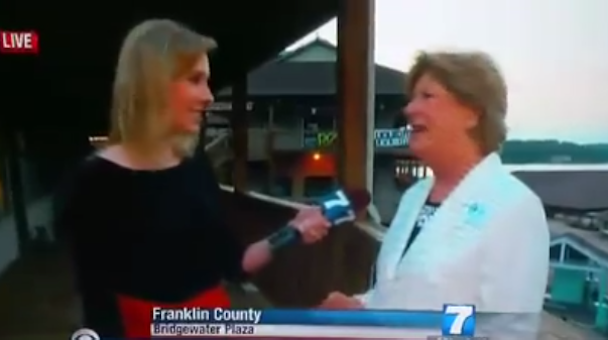The editor's ethical dilemma: Are the media justified in publishing Virginia TV shooter's video?
A TV crew gunned down by a deranged ex-colleague with a grudge. Live on Breakfast TV. Captured in graphic detail by the slain cameraman's own camera, with even more graphic footage of the murder later posted online by the killer himself before he shoots himself dead during a dramatic police chase.

If this was the plot line of a new Netflix crime drama series, its graphic violence and implausible narrative would probably have gone down as acceptable artistic licence. But as this was played out for real, inevitable ethical issues have engulfed the mainstream media in the wake of the brutal, live to air murder of US TV reporter Alison Parker, 24, and her cameraman Adam Ward, 27, of local ABC Virginia affiliate station, WDBJ7.
It's also likely that, despite his clearly unbalanced mind, their killer, sacked former station journalist Vester Flanagan, retained sufficient journalistic nous to know that this was a filmed murder that would turn himself into a kind of instant, infamous global 'superstar' and thrust the TV station against which he'd nursed an obsessive, festering grudge against since being sacked and marched out of the building two years ago into the white heat of worldwide media focus.
It's not far-fetched either to speculate that Vester Flanagan also knew that his crime would pose mainstream media executives across America and around the world with a nightmarish ethical dilemma over how much of the harrowing, horrific footage to air. It was a dilemma he knew would be compounded when, a few hours later, he posted online his own recording of the murders he'd perpetrated, together with the rambling 23-page fax he sent to ABC bosses portraying himself as the 'victim' of discrimination and abuse at Station WDBJ7 because he was 'black and gay'.
It's an accusation the station denies and Flanagan - who worked in the TV industry under the professional name Bryce Williams - had a troubled career history that suggests his complaints were seated more in his disturbed imagination than in reality, but it's maybe too early to pass judgement on that. But Flanagan's attempt to link his killings to the June race hate murders of nine black churchgoers in Charleston, South Carolina, while simultaneously expressing his admiration for the 1999 Columbine High School massacre killers, reinforce his self-diagnosis as a 'human powder keg ready to explode".
There was also a mundane dimension to the killing of the two journalists doing their job that might well have played into Flanagan's twisted, out of control psyche. For Alison Parker and Adam Ward weren't assigned to the dangers of covering a violent US inner city race riot, or a South American narcotics war or the latest barbarous butchery by ISIS. Instead they were engaged in a fluffy shopping mall item on tourism in the unremarkable Virginia town of Moneta when their executioner, armed with a gun and the camera to record his crime, appeared, only too aware of the sickening spectacle he was poised to deliver to a local breakfast TV audience live and later virally around the globe.
In the US, mainstream media varied on how graphically they presented the killer's grim handiwork. In the UK, editors across mainstream broadcasters and newspapers faced the same ethical challenge and tended to err towards relative restraint, or self-censorship. The Sun, which pushed the envelope further than most, faced a backlash on social media. Inevitable, perhaps, but in my mind this was a less than clearcut issue and I wouldn't rush to pillory the editor David Dinsmore.
In reality, the Mirror, Mail, Telegraph and Times front pages were arguably more shocking than the Sun's by featuring the horrified, surprised expression on Alison Parker's face as the gunman opened fire to kill her. But even so I would defend their editor's right to a judgement call on their use... just as I'd defend their readers' right to complain, refrain from buying today's editions or boycott the titles in future if they thought they'd gone too far. That, too, is a judgement call. It goes with the territory if you want both a free press and the public's right to know - or object, if that's their preference.
Where does graphic but brutally honest and accurate recording (online or on the news stand) of an horrific international news story begin and end? When does restraint become self-censorship? When do the mainstream media, ethically or commercially, restrain themselves from what is already out there on social media and the wild west of cyberspace? Does the coverage of a perpetrator of an extraordinary, newsworthy crime like Vester Flanagan fall into a different 'restraint' category than, say, Jihadi John and his attention-seeking executioner role, complete with 'available' footage, 'courtesy' of ISIS? Tricky questions, no easy answers.
In truth, these are all judgement calls for individual editors in individual scenarios for which, in the internet age, there are no convenient one-size-fits-all regulatory or good/bad taste rulebook solutions. Only individual editors' judgement calls at high speed and without the benefit of KIng Solomon's wisdom to guide them. And the jury might well have been out on some of Solomon's judgement calls if he'd had to make them in the age of Facebook, Twitter and www.
Paul Connew is a media commentator and brodcaster, former editor of the Sunday Mirror and deputy editor of the Daily Mirror and co-author of 'After Leveson'
